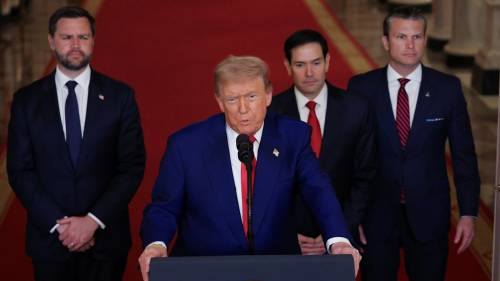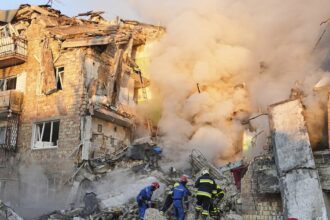The geopolitical chessboard of the Middle East was dramatically upended overnight as U.S. military forces launched precision strikes against Iranian nuclear facilities, marking a significant escalation in the already volatile region. The operation, confirmed by Pentagon officials early this morning, targeted three key nuclear development sites across Iran’s central provinces.
“These strategic strikes were conducted with surgical precision to degrade Iran’s nuclear capabilities while minimizing civilian casualties,” said Defense Secretary Lloyd Austin in a hastily arranged press briefing. “Intelligence assessments indicated accelerated enrichment activities that posed an imminent threat to regional stability.“
The military action comes amid mounting tensions between Iran and Israel, which have engaged in a dangerous cycle of retaliatory strikes since early April. According to CO24 World News intelligence sources, the U.S. decision was precipitated by credible intelligence suggesting Iran had crossed critical thresholds in weapons-grade uranium enrichment.
International reaction has been swift and divided. European allies expressed cautious support while emphasizing diplomatic solutions, with French President Emmanuel Macron calling for “immediate de-escalation and return to dialogue.” Russia and China strongly condemned the strikes, with Moscow calling an emergency UN Security Council meeting for tomorrow.
Oil markets responded with predictable volatility, as Brent crude prices surged nearly 8% in early trading. Financial analysts at major investment firms warn of potential supply disruptions should the conflict expand to affect strategic shipping lanes in the Persian Gulf. Our CO24 Business desk reports that energy companies are already implementing contingency plans for possible supply chain disruptions.
Iranian Supreme Leader Ayatollah Ali Khamenei vowed a “crushing response” to what he termed “American aggression,” while mobilizing Revolutionary Guard units across the country. Tehran claims the targeted facilities were for civilian energy purposes, though IAEA inspectors had previously flagged inconsistencies in Iran’s declarations.
The Biden administration faces significant domestic scrutiny over the decision. Congressional leaders from both parties have requested classified briefings, with some questioning the constitutional basis for military action without explicit congressional approval. “The American people deserve transparency about our involvement in yet another Middle East conflict,” stated Senator Chris Murphy during an interview with CO24 Politics.
Regional security experts highlight the dangerous new phase this represents in Middle Eastern geopolitics. “We’re witnessing the potential collapse of the fragile nuclear non-proliferation framework that has governed international relations for decades,” explains Dr. Sarah Abramson, senior fellow at the Council on International Security. “The ripple effects will extend far beyond Iran and Israel.”
For ordinary Iranians, already struggling under crushing economic sanctions, the strikes represent yet another hardship. Tehran’s main bazaar closed today as citizens stockpiled essentials amid fears of prolonged conflict. Humanitarian organizations warn of potential refugee crises should hostilities continue to escalate.
As world leaders scramble to prevent further escalation, the fundamental question remains: can diplomatic channels still prevail in a region where military solutions have repeatedly failed to deliver lasting peace?










